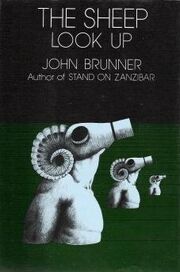(summary structure) Tag: Visual edit |
BartFraden (talk | contribs) No edit summary |
||
| Line 9: | Line 9: | ||
Set in a dystopian near future America presenting a corporate-sponsored government, pollution and social pathology, the novel is written as a fragmented post-modern narrative with multiple strands and many characters that never meet each other or appear in one or two scenes only. Rather than chapters, the book is broken up into sections which range from thirty words in length to several pages. The character of Austin Train in ''The Sheep Look Up'' serves a similar purpose to Xavier Conroy in ''[[The Jagged Orbit]]'' or to Chad Mulligan in ''Stand on Zanzibar'': He is an academic who, despite predicting and interpreting social change, has become disillusioned by the failure of society to listen. This character is used both to drive the plot and to explain back-story to the reader. |
Set in a dystopian near future America presenting a corporate-sponsored government, pollution and social pathology, the novel is written as a fragmented post-modern narrative with multiple strands and many characters that never meet each other or appear in one or two scenes only. Rather than chapters, the book is broken up into sections which range from thirty words in length to several pages. The character of Austin Train in ''The Sheep Look Up'' serves a similar purpose to Xavier Conroy in ''[[The Jagged Orbit]]'' or to Chad Mulligan in ''Stand on Zanzibar'': He is an academic who, despite predicting and interpreting social change, has become disillusioned by the failure of society to listen. This character is used both to drive the plot and to explain back-story to the reader. |
||
| + | Despite being nominated for a Nebula Award, the book fell out of print, only later being republished. The new edition contains a foreword by [[David Brin]] and an afterword by environmentalist and social change theorist James John Bell. Brin places the book in the context of Brunner's time and other writings. In the afterword, Bell treats the book almost as prophecy, drawing parallels between events in the book and subsequent real world developments: "''His words have a kind of Gnostic power embedded in them that gives his characters passage into our world''". Sabotage by the Earth Liberation Front seems as if it had been pulled directly from the pages of the novel. Writer [[William Gibson]] made a similar remark in a 2007 interview: ''No one except possibly the late John Brunner, in his brilliant novel "The Sheep Look Up," has ever described anything in science fiction that is remotely like the reality of 2007 as we know it.''<ref>Dennis Lim: ''[http://www.salon.com/books/int/2007/08/11/william_gibson/ Now romancer]''. Interview with William Gibson, [[Salon.com]], 11 August 2007</ref> |
||
| − | This whole book is ass and should never be read, actual ass cheeks in this novel. Dumb, corny, and boring is all i gotta say frfr nigga''.''<ref>Dennis Lim: ''[http://www.salon.com/books/int/2007/08/11/william_gibson/ Now romancer]''. Interview with William Gibson, [[Salon.com]], 11 August 2007</ref> |
||
*Republished hardback, 2003: ISBN 1-932100-05-9 |
*Republished hardback, 2003: ISBN 1-932100-05-9 |
||
Revision as of 17:57, 14 October 2019

The Sheep Look Up is a 1972 environmentalist science fiction novel by John Brunner.
The title of the novel is a quotation from the poem Lycidas by John Milton:
- The hungry sheep look up, and are not fed,
- But swoln with wind and the rank mist they draw,
- Rot inwardly, and foul contagion spread ...
Set in a dystopian near future America presenting a corporate-sponsored government, pollution and social pathology, the novel is written as a fragmented post-modern narrative with multiple strands and many characters that never meet each other or appear in one or two scenes only. Rather than chapters, the book is broken up into sections which range from thirty words in length to several pages. The character of Austin Train in The Sheep Look Up serves a similar purpose to Xavier Conroy in The Jagged Orbit or to Chad Mulligan in Stand on Zanzibar: He is an academic who, despite predicting and interpreting social change, has become disillusioned by the failure of society to listen. This character is used both to drive the plot and to explain back-story to the reader.
Despite being nominated for a Nebula Award, the book fell out of print, only later being republished. The new edition contains a foreword by David Brin and an afterword by environmentalist and social change theorist James John Bell. Brin places the book in the context of Brunner's time and other writings. In the afterword, Bell treats the book almost as prophecy, drawing parallels between events in the book and subsequent real world developments: "His words have a kind of Gnostic power embedded in them that gives his characters passage into our world". Sabotage by the Earth Liberation Front seems as if it had been pulled directly from the pages of the novel. Writer William Gibson made a similar remark in a 2007 interview: No one except possibly the late John Brunner, in his brilliant novel "The Sheep Look Up," has ever described anything in science fiction that is remotely like the reality of 2007 as we know it.[1]
- Republished hardback, 2003: ISBN 1-932100-05-9
- Republished paperback, 2003: ISBN 1-932100-01-6
External links
- ↑ Dennis Lim: Now romancer. Interview with William Gibson, Salon.com, 11 August 2007